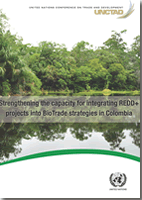Strengthening the Capacity in Integrating REDD+ Projects into BioTrade Strategies in Colombia

Market based mechanisms for climate change mitigation and trade of biodiversity-based products and services offer an opportunity for countries to conserve their forests and invest in low-carbon emission paths to achieve sustainable development. The mitigation of carbon emissions can be done through REDD+1 by reducing emissions from deforestation and forest degradation while fostering the conservation and sustainable management of forests and its forest carbon stocks. On the other side, positive market trends for environmentally and socially fair products and services derived from biodiversity are being captured by countries working under the BioTrade Initiative of UNCTAD. The later promote trade and investment in biodiversity-based sectors as a way to achieve sustainable development in 21 countries in Africa, Asia and Latin America.
The combination of REDD+ and BioTrade offers additional financial incentives for developing countries to reduce carbon emissions from deforestation and forest degradation while sustainably using and tradings derived products and services such as essential and vegetable oils, and ecotourism, among others. Harnessing these opportunities for developing countries is what UNCTAD aimed to explore and enhance through the project "Strengthening the capacity of policy-makers and business leaders in three BioTrade beneficiary countries in integrating REDD+ projects into BioTrade strategies" in Colombia, Ecuador and Brazil.
This report presents the findings of the project in Colombia. It provides an overview of the regulatory framework, initiatives, opportunities and constraints pertaining to the implementation of REDD+ and BioTrade in Colombia. It also analyses the feasibility of linking REDD+ strategies and BioTrade in Colombia and provide recommendations on the way forward.
1REDD = Reducing Emissions from Deforestation and Forest Degradation




